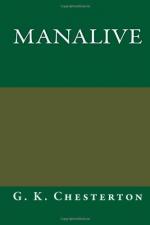“Oh, crikey!” said Moses Gould, stifled with amusement.
“There could hardly,” interposed Pym with a quiet smile, “be a better instance of the neglect of true scientific process. The scientist, when once convinced of the fact of vitality and consciousness, would infer from these the previous process of generation.”
“If these gals,” said Gould impatiently—“if these gals were all alive (all alive O!) I’d chance a fiver they were all born.”
“You’d lose your fiver,” said Michael, speaking gravely out of the gloom. “All those admirable ladies were alive. They were more alive for having come into contact with Smith. They were all quite definitely alive, but only one of them was ever born.”
“Are you asking us to believe—” began Dr. Pym.
“I am asking you a second question,” said Moon sternly. “Can the court now sitting throw any light on a truly singular circumstance? Dr. Pym, in his interesting lecture on what are called, I believe, the relations of the sexes, said that Smith was the slave of a lust for variety which would lead a man first to a negress and then to an albino, first to a Patagonian giantess and then to a tiny Eskimo. But is there any evidence of such variety here? Is there any trace of a gigantic Patagonian in the story? Was the typewriter an Eskimo? So picturesque a circumstance would not surely have escaped remark. Was Lady Bullingdon’s dressmaker a negress? A voice in my bosom answers, `No!’ Lady Bullingdon, I am sure, would think a negress so conspicuous as to be almost Socialistic, and would feel something a little rakish even about an albino.
“But was there in Smith’s taste any such variety as the learned doctor describes? So far as our slight materials go, the very opposite seems to be the case. We have only one actual description of any of the prisoner’s wives— the short but highly poetic account by the aesthetic curate. `Her dress was the colour of spring, and her hair of autumn leaves.’ Autumn leaves, of course, are of various colours, some of which would be rather startling in hair (green, for instance); but I think such an expression would be most naturally used of the shades from red-brown to red, especially as ladies with their coppery-coloured hair do frequently wear light artistic greens. Now when we come to the next wife, we find the eccentric lover, when told he is a donkey, answering that donkeys always go after carrots; a remark which Lady Bullingdon evidently regarded as pointless and part of the natural table-talk of a village idiot, but which has an obvious meaning if we suppose that Polly’s hair was red. Passing to the next wife, the one he took from the girls’ school, we find Miss Gridley noticing that the schoolgirl in question wore `a reddish-brown dress, that went quietly enough with the warmer colour of her hair.’ In other words, the colour of the girl’s hair was something redder than red-brown. Lastly, the romantic organ-grinder declaimed in the office some poetry that only got as far as the words,—




